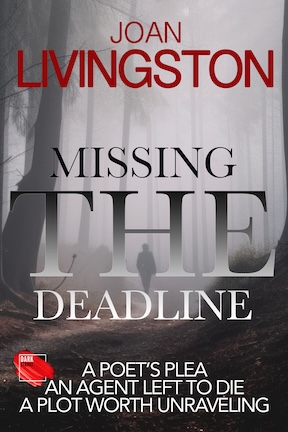Today is the Solstice, in which winter takes its turn on the shortest day of the year. It also means the launch of my next book, Missing the Deadline, no. 7 in my Isabel Long Mystery Series.
I began this series with Chasing the Case when we still lived in Taos, New Mexico. That was in late 2016. One day I got it in my head that I wanted to write a mystery. I had already written books for adult and young readers, literary fiction and magical realism, respectively. One is even bilingual.
So, I sat down at my computer and the pieces came together fast for Chasing the Case. Extremely fast. That’s how it works for me.
It made sense that my protagonist, Isabel Long, would tell the story, so I wrote it in first-person, and because I want my readers to feel they’re in the middle of the action, in present tense as well
Here’s Isabel’s back story: she’s just come off a bad year after her husband died and she lost her job as a newspaper’s top editor when it went corporate. She is what the French call une femme d’un certain age. Isabel’s bit of a smart ass but she has a caring heart. Yes, I’ll admit there is quite a lot of me in her.
After a year of properly grieving, Isabel is ready for a new life. And that’s when we first meet her. She decides to solve a 28-year-old mystery of a woman who went missing in her town of a thousand people. It was Isabel’s first big story as a rookie reporter.
Isabel uses the tools she relied on as a journalist to solve this case. And she has a ‘Watson’ — her 92-year-old mystery-loving mother who’s come to live with her. (My late mother inspired this character.) Isabel also takes a part-time job at the local watering hole, the Rooster, where not only does she find clues for her case, but a love interest in its owner, Jack, a local guy.
I had such fun writing Chasing the Case, I quickly went onto the next, Redneck’s Revenge. Hey, I thought, maybe I’ll turn this into a series.
I struck out querying agents and publishers until I found Crooked Cat Books. Here was the message I got from Laurence and Steph Patterson in Fall 2017: “Thank you very much indeed for reaching out to Crooked Cat with your submission recently. We loved what we’ve read so far of Chasing the Case, and would therefore welcome the remainder of the story for our further consideration. Do please be in touch.”
And now Crooked Cat through its imprint darkstroke books has stuck with me through this series as well as publishing two of my hilltown books, The Sacred Dog and Northern Comfort.
Writing a series means I can hold onto the characters I love but let them do something else. That’s what happens in Missing the Deadline. Cyrus Nilsson, the noted poet who was once a suspect in a previous case, becomes a client wanting her to investigate the shooting of his first literary agent.
Gerald Danielson was found shot in the head at his home in Meadows Falls. He survived but isn’t the same successful agent who moved there from New York City. The police ruled it an attempted suicide, but Cyrus has his doubts. Certainly there are people, including a vindictive ex-wife, a jilted local writer, and even an apparently devoted sister, who might have motive.
I will be telling you more about the characters, themes and settings for Missing the Deadline in future posts.
But for now I want you to know Missing the Deadline is live on Kindle. Paperback readers will have to wait a few months. Thank you to those who continue to read my books.
Oh, one another announcement: I am well into writing no. 8, Following the Source. Wait ‘til you read what Isabel is up to next.







